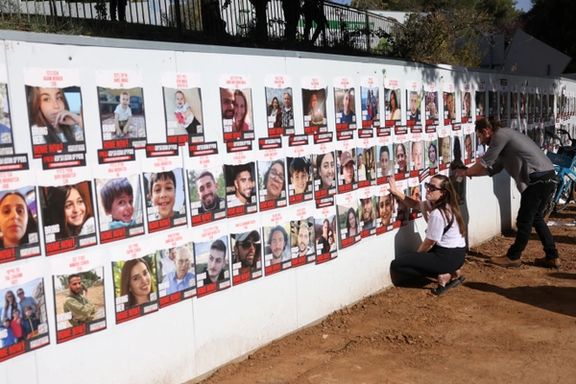Iran Delayed Hamas Attack To Secure Ransom Deal With US – Report

Iran denies involvement in the Hamas massacre of October 7, but a new report says the Islamist group postponed the attack upon coordination with Tehran.

Iran denies involvement in the Hamas massacre of October 7, but a new report says the Islamist group postponed the attack upon coordination with Tehran.
Israeli journalist Ben Caspit said Sunday that Hamas's mass infiltration and onslaught leaving 1,400 mostly civilians dead and 241 hostages taken into Gaza, was originally intended to take place during last Passover's Seder meal Jewish holiday in April, which happened to coincide with Quds Day – an annual anti-Israel event initiated by the founder of the Islamic Republic, Rouhollah Khomeini.
According to the report, the Islamic Republic decided to delay the organized assault on civilians to Simchat Torah due to reasons that are unclear. However, Caspit speculated, it could have been postponed due to Tehran’s informal behind-the-scenes talks with the United States, which culminated in the release of Iran's oil revenues frozen in South Korea under US sanctions.
About $6 billion was freed up for Iran mid-September after Iran released five Iranian-Americans held in Tehran in exchange for five Iranians imprisoned in the US. Hamas declared war on Israel less than a month later. Iran openly supports Hamas and supplies military technology, training and logistics for its so-called ‘resistance’ against Israel and even held celebrations for the attack but insists it had no role in it.

The extent of the regime’s involvement in the Hamas attack, if and when it is established, would likely inform the nature of the response from Israel and the United States. Many in Washington are already pushing for retaliatory measures, including re-freezing the $6 billion. US Senators have written to President Biden, demanding that access to the money (currently held in a Qatari bank) be denied.
Hamas’ attack on Israel has enraged US officials who had warned the Biden administration of the consequences of its lenient approach to the regime in Iran. “Make no mistake— Hamas's genocidal violence was partly enabled by Biden unfreezing billions of dollars to Iran,” Senator Ted Cruz said Tuesday.
Last year in an interview with Al Jazeera, Hamas chief Ismail Haniyeh publicly thanked Tehran for supporting it with $70 million to help it develop missiles and defense systems, saying the regime is the terror group’s biggest donor. Gabriel Noronha, a former special advisor for the Iran Action Group at the US Department of State, said last month, Iran was giving Hamas $100 million a year in 2017 and with the Trump administration's maximum pressure policy on Iran, the Islamist group had to adopt austerity measures, but today “Hamas is getting $350 million from Iran that is 93 percent of its budget.”
The information was uncovered during the interrogation of Hamas militants who participated in the October 7 massacre, codenamed operation al-Aqsa flood (storm in Persian). The US considers Iran "at least complicit” in the attack, the State Department said last month but insisted it had no evidence of Tehran's direct involvement. Caspit noted that the information "might not have reached decision-makers or passed a validity test. But it did reach the ears of interrogators.”
Elsewhere in his reports, Caspit said that the October 7 date was chosen partly due to its proximity to the 50th anniversary of the Yom Kippur War, a three-week armed conflict fought in October 1973 between Israel and a coalition of Arab states led by Egypt and Syria.